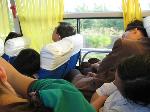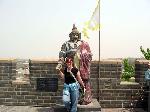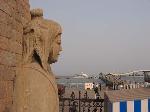- Getting around Lijiang. Dont stay in the Old Towns more than 2 days, there is nothing to do. KRISS Oct 9, 2013 05:46
- 2013 Beijing Temple Fair BENNYLAU Feb 26, 2013 03:29
- Malaysian traveling from KUL - LAX vis Shanghai PVG ZATI_DY Jan 3, 2013 20:15
The Life of Qin
- Views: 5612
- |Vote: 0 0
- |Add to Favorites
- |Recommend to Friends
Arrival
Everything has a beginning and an end. QinHuangDao, a coastal city in Hebei province, is a city containing more than one important Asian beginning. I went there to begin my first May Golden week holiday.
QinHuangDao is named after the famous Chinese emperor QinShiHuangDi, the man typically credited with building the great wall. From what I understood while there, he sometimes went to QinHuangDao in the summer to cool off and hang out. Today, the cities ShanHaiGuan and BeiDaiHe seem more popular and touristy. The three cities are close enough together that they don't really stand out in my head as distinct places, although each sports its own special attractions.
Getting to QinHuangDao was an adventure in and of itself. I took a bus from Beijing there. I spent hours in Beijing trying to figure out which bus station had the bus I was looking for, then what time said bus left. When all was said and done, I ended up on a private bus, which took lots of side roads that were all dirt and rock. We drove through lots of tiny villages, which was great, since I felt like I was seeing things I couldn't have seen, otherwise, although I would've been in trouble had the bus broken down. The bus was packed full and I was the only one on it besides the driver who was awake for most of the time. When I finally arrived, my friend picked me up and informed me that her family was in the process of moving into a new house, so they'd found me a hotel to stay in for a night or two instead. Not a problem, I assured her.
Touring on Foot
The first afternoon in QinHuangDao was a walking tour of the city. We walked around a university campus that had a nice river, grass, and goldfish. This beat the pants of the university I was teaching at at the time. You know you're in China when you're thinking "They're so lucky! They actually have grass on campus!"
We walked on to the coast. This wasn't destined to be a beach holiday, though, as it was too cool in early May to consider swimming yet. I didn't have my coat on, but was glad to have my sweater. Despite the crisp spring wind, the beach was far from empty. Plenty of people were wading in the water, flying kites, and gaping at each other. There were also some fisherman out there, in waist-high waders, in a boat that looked 400 years old, pulling in rubber containers full of oysters.
Not far from that spot of beach, there are a few Olympic buildings. In 2008, a few Olympic games will be held in the city. I peeked into the football (American soccer) stadium and and what I think was the ping pong stadium. Then we walked to a little cafe, where we had some ice cream and played Chinese Checkers for a little while. That was exciting, because I'd seen Chinese Chess in China, but it was my first time seeing Chinese Checkers since I was a little girl.
Great Wall Take One
The next day, we hit one of the major tourist attractions: The ShanHaiGuan Pass of the Great Wall. I've seen the Great Wall in three different cities, and I can't honestly say this was my favorite part of it, but it was interesting. The day we were there, there was some kind of a martial arts competition going on, which I didn't get to actually witness, but it meant lots of banners and people in different colored robes. The part of the Great Wall I went to there was all new-looking, and this isn't the place where you can see it going into the water. Instead, we saw lots of big stone statues of guards and scholars, and the flat roofs of the city. This is actually in ShanHaiGuan, incidentally, as the name implies. Another spot nearby that I heard about but didn't get to was the spot where, supposedly, a woman named Meng JiangNu's weeping for her husband (who died while building the Great
Wall) made a big section collapse, revealing his skeleton inside.
The Search is On
The next day, we saw what was probably my highlight of the visit: The Dragon's Head, aka LaoLongTou, aka the place where the Great Wall meets the sea, aka where Emperor Qin sent out a search party looking for immortality. This place had everything. It had acrobats, dancing Chinese lions, dancing minority groups, statues, a beach, gardens, and a creepy re-enactment of things that happened more than 2000 years ago. So, the story is, as Emperor Qin got older and older, he got more and more obsessed with immortality. Finally, toward the end of his life, he brought some alchemists to QinHuangDao and sent out a boat of virgin boys and girls in search of the magic elixor. Legend has it that these boys and girls ended up in Japan, thus starting the Japanese race. Of course, this is little more than supposition and legend.
I have to say, though, this was one of my favorite touristy stops in all of China. Maybe because the dark museum-like rooms with ceramic statues of the sea god being driven off or the emperor's advisors looking dubious about something else going on reminded me of places back home. Maybe because of the outdoor live performances, all of which were hard to walk away from. Maybe because of all the statues, which struck me as more affecting than statues elsewhere--especially the ones lining the walkway to the water, where the boat supposedly set off. There, a few dozen statues line a set of stairs, ending in the 12 virgin boys and girls, most of whom look nervous or resigned. then, in the middle of everythere, there's a huge statue of the Emperor, leaning out toward the sea, gesturing, holding out an offering, looking like he is absolutely determined for this to work, for his life to go on forever.
And really, it all worked, didn't it? In china, Emperor Qin seems eternal sometimes. Places like that feel like he's still there, making his sacrifices, scheming, making things happen.







 Copyright © 1998-2026 All rights reserved.
Copyright © 1998-2026 All rights reserved.
1.
Apr 28, 2007 19:22 Reply
CHYNAGYRL said:
oh!! you answered the question I had in mind. I was wondering if that story was true -- about the Chinese origins of the Japanese race -- but it sounds dubious at best.